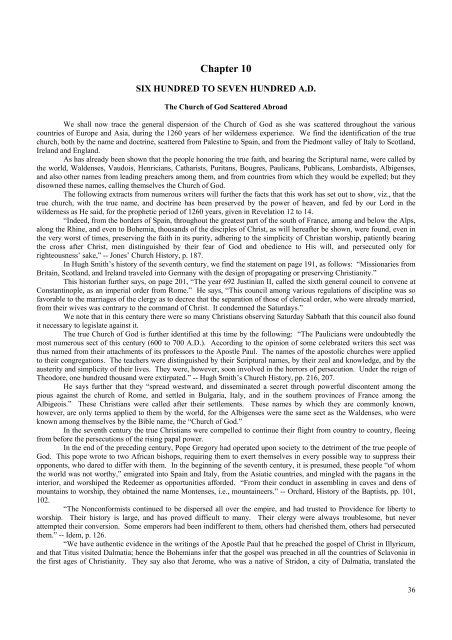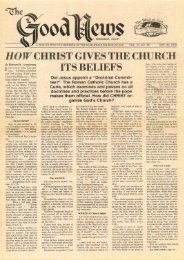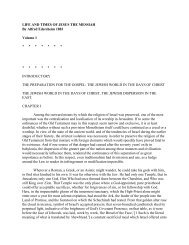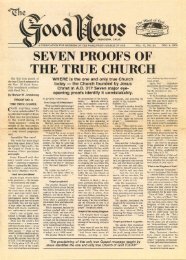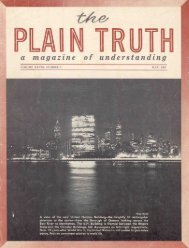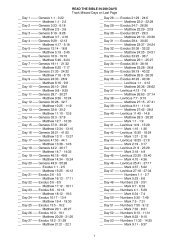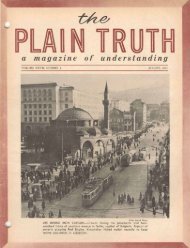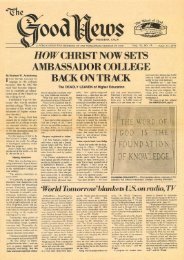History of the True Religion Traced from 33AD to Date - Lcgmn.com
History of the True Religion Traced from 33AD to Date - Lcgmn.com
History of the True Religion Traced from 33AD to Date - Lcgmn.com
You also want an ePaper? Increase the reach of your titles
YUMPU automatically turns print PDFs into web optimized ePapers that Google loves.
Chapter 10<br />
SIX HUNDRED TO SEVEN HUNDRED A.D.<br />
The Church <strong>of</strong> God Scattered Abroad<br />
We shall now trace <strong>the</strong> general dispersion <strong>of</strong> <strong>the</strong> Church <strong>of</strong> God as she was scattered throughout <strong>the</strong> various<br />
countries <strong>of</strong> Europe and Asia, during <strong>the</strong> 1260 years <strong>of</strong> her wilderness experience. We find <strong>the</strong> identification <strong>of</strong> <strong>the</strong> true<br />
church, both by <strong>the</strong> name and doctrine, scattered <strong>from</strong> Palestine <strong>to</strong> Spain, and <strong>from</strong> <strong>the</strong> Piedmont valley <strong>of</strong> Italy <strong>to</strong> Scotland,<br />
Ireland and England.<br />
As has already been shown that <strong>the</strong> people honoring <strong>the</strong> true faith, and bearing <strong>the</strong> Scriptural name, were called by<br />
<strong>the</strong> world, Waldenses, Vaudois, Henricians, Catharists, Puritans, Bougres, Paulicans, Publicans, Lombardists, Albigenses,<br />
and also o<strong>the</strong>r names <strong>from</strong> leading preachers among <strong>the</strong>m, and <strong>from</strong> countries <strong>from</strong> which <strong>the</strong>y would be expelled; but <strong>the</strong>y<br />
disowned <strong>the</strong>se names, calling <strong>the</strong>mselves <strong>the</strong> Church <strong>of</strong> God.<br />
The following extracts <strong>from</strong> numerous writers will fur<strong>the</strong>r <strong>the</strong> facts that this work has set out <strong>to</strong> show, viz., that <strong>the</strong><br />
true church, with <strong>the</strong> true name, and doctrine has been preserved by <strong>the</strong> power <strong>of</strong> heaven, and fed by our Lord in <strong>the</strong><br />
wilderness as He said, for <strong>the</strong> prophetic period <strong>of</strong> 1260 years, given in Revelation 12 <strong>to</strong> 14.<br />
“Indeed, <strong>from</strong> <strong>the</strong> borders <strong>of</strong> Spain, throughout <strong>the</strong> greatest part <strong>of</strong> <strong>the</strong> south <strong>of</strong> France, among and below <strong>the</strong> Alps,<br />
along <strong>the</strong> Rhine, and even <strong>to</strong> Bohemia, thousands <strong>of</strong> <strong>the</strong> disciples <strong>of</strong> Christ, as will hereafter be shown, were found, even in<br />
<strong>the</strong> very worst <strong>of</strong> times, preserving <strong>the</strong> faith in its purity, adhering <strong>to</strong> <strong>the</strong> simplicity <strong>of</strong> Christian worship, patiently bearing<br />
<strong>the</strong> cross after Christ, men distinguished by <strong>the</strong>ir fear <strong>of</strong> God and obedience <strong>to</strong> His will, and persecuted only for<br />
righteousness’ sake,” -- Jones’ Church <strong>His<strong>to</strong>ry</strong>, p. 187.<br />
In Hugh Smith’s his<strong>to</strong>ry <strong>of</strong> <strong>the</strong> seventh century, we find <strong>the</strong> statement on page 191, as follows: “Missionaries <strong>from</strong><br />
Britain, Scotland, and Ireland traveled in<strong>to</strong> Germany with <strong>the</strong> design <strong>of</strong> propagating or preserving Christianity.”<br />
This his<strong>to</strong>rian fur<strong>the</strong>r says, on page 201, “The year 692 Justinian II, called <strong>the</strong> sixth general council <strong>to</strong> convene at<br />
Constantinople, as an imperial order <strong>from</strong> Rome.” He says, “This council among various regulations <strong>of</strong> discipline was so<br />
favorable <strong>to</strong> <strong>the</strong> marriages <strong>of</strong> <strong>the</strong> clergy as <strong>to</strong> decree that <strong>the</strong> separation <strong>of</strong> those <strong>of</strong> clerical order, who were already married,<br />
<strong>from</strong> <strong>the</strong>ir wives was contrary <strong>to</strong> <strong>the</strong> <strong>com</strong>mand <strong>of</strong> Christ. It condemned <strong>the</strong> Saturdays.”<br />
We note that in this century <strong>the</strong>re were so many Christians observing Saturday Sabbath that this council also found<br />
it necessary <strong>to</strong> legislate against it.<br />
The true Church <strong>of</strong> God is fur<strong>the</strong>r identified at this time by <strong>the</strong> following: “The Paulicians were undoubtedly <strong>the</strong><br />
most numerous sect <strong>of</strong> this century (600 <strong>to</strong> 700 A.D.). According <strong>to</strong> <strong>the</strong> opinion <strong>of</strong> some celebrated writers this sect was<br />
thus named <strong>from</strong> <strong>the</strong>ir attachments <strong>of</strong> its pr<strong>of</strong>essors <strong>to</strong> <strong>the</strong> Apostle Paul. The names <strong>of</strong> <strong>the</strong> apos<strong>to</strong>lic churches were applied<br />
<strong>to</strong> <strong>the</strong>ir congregations. The teachers were distinguished by <strong>the</strong>ir Scriptural names, by <strong>the</strong>ir zeal and knowledge, and by <strong>the</strong><br />
austerity and simplicity <strong>of</strong> <strong>the</strong>ir lives. They were, however, soon involved in <strong>the</strong> horrors <strong>of</strong> persecution. Under <strong>the</strong> reign <strong>of</strong><br />
Theodore, one hundred thousand were extirpated.” -- Hugh Smith’s Church <strong>His<strong>to</strong>ry</strong>, pp. 216, 207.<br />
He says fur<strong>the</strong>r that <strong>the</strong>y “spread westward, and disseminated a secret through powerful discontent among <strong>the</strong><br />
pious against <strong>the</strong> church <strong>of</strong> Rome, and settled in Bulgaria, Italy, and in <strong>the</strong> sou<strong>the</strong>rn provinces <strong>of</strong> France among <strong>the</strong><br />
Albigeois.” These Christians were called after <strong>the</strong>ir settlements. These names by which <strong>the</strong>y are <strong>com</strong>monly known,<br />
however, are only terms applied <strong>to</strong> <strong>the</strong>m by <strong>the</strong> world, for <strong>the</strong> Albigenses were <strong>the</strong> same sect as <strong>the</strong> Waldenses, who were<br />
known among <strong>the</strong>mselves by <strong>the</strong> Bible name, <strong>the</strong> “Church <strong>of</strong> God.”<br />
In <strong>the</strong> seventh century <strong>the</strong> true Christians were <strong>com</strong>pelled <strong>to</strong> continue <strong>the</strong>ir flight <strong>from</strong> country <strong>to</strong> country, fleeing<br />
<strong>from</strong> before <strong>the</strong> persecutions <strong>of</strong> <strong>the</strong> rising papal power.<br />
In <strong>the</strong> end <strong>of</strong> <strong>the</strong> preceding century, Pope Gregory had operated upon society <strong>to</strong> <strong>the</strong> detriment <strong>of</strong> <strong>the</strong> true people <strong>of</strong><br />
God. This pope wrote <strong>to</strong> two African bishops, requiring <strong>the</strong>m <strong>to</strong> exert <strong>the</strong>mselves in every possible way <strong>to</strong> suppress <strong>the</strong>ir<br />
opponents, who dared <strong>to</strong> differ with <strong>the</strong>m. In <strong>the</strong> beginning <strong>of</strong> <strong>the</strong> seventh century, it is presumed, <strong>the</strong>se people “<strong>of</strong> whom<br />
<strong>the</strong> world was not worthy,” emigrated in<strong>to</strong> Spain and Italy, <strong>from</strong> <strong>the</strong> Asiatic countries, and mingled with <strong>the</strong> pagans in <strong>the</strong><br />
interior, and worshiped <strong>the</strong> Redeemer as opportunities afforded. “From <strong>the</strong>ir conduct in assembling in caves and dens <strong>of</strong><br />
mountains <strong>to</strong> worship, <strong>the</strong>y obtained <strong>the</strong> name Montenses, i.e., mountaineers.” -- Orchard, <strong>His<strong>to</strong>ry</strong> <strong>of</strong> <strong>the</strong> Baptists, pp. 101,<br />
102.<br />
“The Nonconformists continued <strong>to</strong> be dispersed all over <strong>the</strong> empire, and had trusted <strong>to</strong> Providence for liberty <strong>to</strong><br />
worship. Their his<strong>to</strong>ry is large, and has proved difficult <strong>to</strong> many. Their clergy were always troublesome, but never<br />
attempted <strong>the</strong>ir conversion. Some emperors had been indifferent <strong>to</strong> <strong>the</strong>m, o<strong>the</strong>rs had cherished <strong>the</strong>m, o<strong>the</strong>rs had persecuted<br />
<strong>the</strong>m.” -- Idem, p. 126.<br />
“We have au<strong>the</strong>ntic evidence in <strong>the</strong> writings <strong>of</strong> <strong>the</strong> Apostle Paul that he preached <strong>the</strong> gospel <strong>of</strong> Christ in Illyricum,<br />
and that Titus visited Dalmatia; hence <strong>the</strong> Bohemians infer that <strong>the</strong> gospel was preached in all <strong>the</strong> countries <strong>of</strong> Sclavonia in<br />
<strong>the</strong> first ages <strong>of</strong> Christianity. They say also that Jerome, who was a native <strong>of</strong> Stridon, a city <strong>of</strong> Dalmatia, translated <strong>the</strong><br />
36


